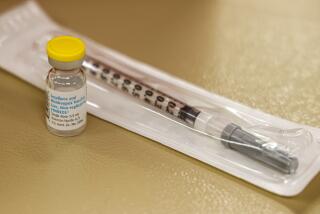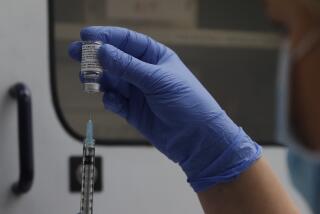Anthrax Vaccine Problems Are Few, U.S. Health Officials Say
- Share via
ATLANTA — Studies of the health effects of the anthrax vaccine given to U.S. military personnel have found no unexpected adverse reactions, federal health officials said Thursday.
The Centers for Disease Control and Prevention (CDC) said a small percentage of service members complained of muscle or joint aches, headache, or fatigue after being vaccinated.
The U.S. Department of Defense, concerned about the threat of biological warfare, launched a program in May 1998 to administer a six-dose anthrax vaccine to all 2.4 million active and reserve military personnel by 2004.
As of February, more than 400,000 service members had received the mandatory anthrax inoculations. About 350 military personnel have refused vaccination, in some cases because they were concerned that the vaccine was unsafe or ineffective.
The CDC said three surveys found no unexpected reactions to the vaccine. The studies indicated that women were more likely than men to report minor side effects, but researchers said they did not know why.
In Korea, 1.9% of 4,348 service members who had received at least two doses of the vaccine reported minor side effects that limited their work performance, but the effects generally only lasted a day and did not require medical intervention.
A study by the Tripler Army Medical Center in Honolulu found that 7.9% of 595 health-care workers surveyed sought medical advice or took time off duty because of minor side effects after receiving their first dose of vaccine.
Overall, the Department of Defense said it has received 428 reports of adverse reactions. In 36 of those cases did military personnel require hospitalization or more than one day off duty to recover.
The CDC said early research indicates that injecting the vaccine into muscle, instead of directly below the skin, can reduce short-term side effects.
Anthrax spores are odorless, invisible and lethal when inhaled. The Department of Defense describes the anthrax bacteria as 100,000 times more potent than the deadliest chemical-warfare agent.






